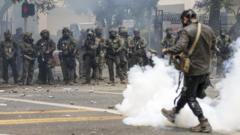In a surprising twist, Greater Toronto could potentially swing the outcome of Canada's upcoming federal election. Traditionally a Liberal stronghold, the recent electoral trends reveal a shift, particularly following President Trump's imposition of tariffs on Canada, affecting the perceived economic stability in the region.
### Toronto's Unforeseen Shift: How the Region's Vote Could Shape Canada's Future

### Toronto's Unforeseen Shift: How the Region's Vote Could Shape Canada's Future
As the Canadian federal election looms, Greater Toronto emerges as a pivotal battleground following unexpected voter sentiment changes.
After enduring a tough year marked by dwindling poll numbers, the Liberal Party faced the shocking loss of a long-held seat in downtown Toronto, igniting concerns about their power base. This defeat is widely considered a catalyst for Prime Minister Justin Trudeau’s subsequent resignation and set the stage for the approaching elections.
With 343 parliamentary seats up for grabs, the stakes are particularly high in the Greater Toronto Area (GTA), which encompasses 56 districts and is home to approximately 7 million residents. Observers believe that the outcome here could greatly influence Canada's direction, especially amid ongoing trade tensions with the United States.
The leading contestants of this political contest are Liberal candidate Mark Carney and Conservative challenger Pierre Poilievre, both vying to win over the critical voter demographic in the metropolitan hub. As analysts closely monitor the unfolding situation, it remains to be seen whether the Conservatives can capitalize on their recent momentum in this vital area. The results could have lasting implications, redefining party dynamics and leadership in Canada for years to come.
With 343 parliamentary seats up for grabs, the stakes are particularly high in the Greater Toronto Area (GTA), which encompasses 56 districts and is home to approximately 7 million residents. Observers believe that the outcome here could greatly influence Canada's direction, especially amid ongoing trade tensions with the United States.
The leading contestants of this political contest are Liberal candidate Mark Carney and Conservative challenger Pierre Poilievre, both vying to win over the critical voter demographic in the metropolitan hub. As analysts closely monitor the unfolding situation, it remains to be seen whether the Conservatives can capitalize on their recent momentum in this vital area. The results could have lasting implications, redefining party dynamics and leadership in Canada for years to come.



















